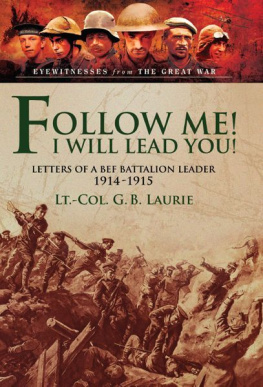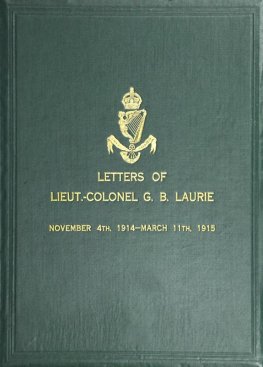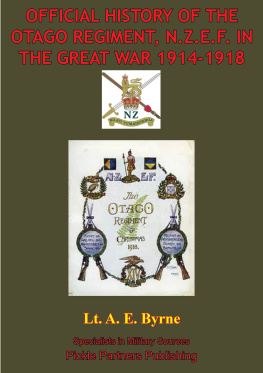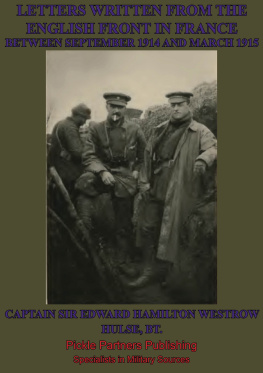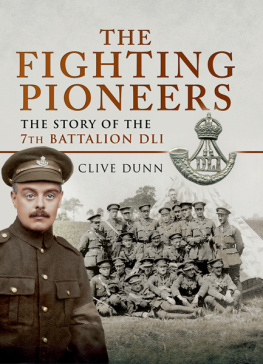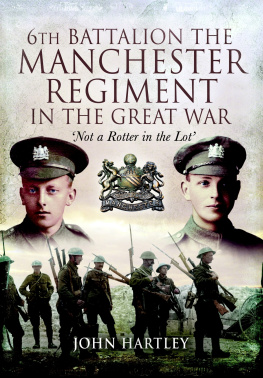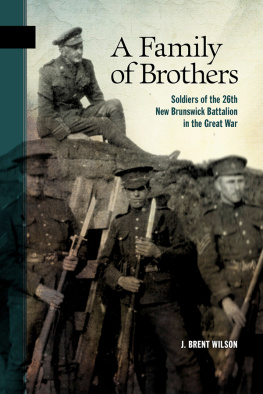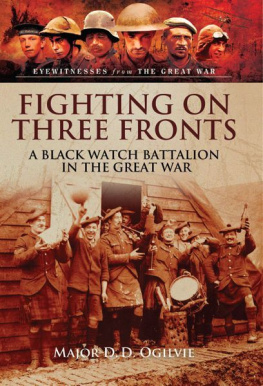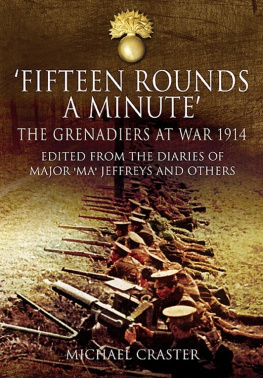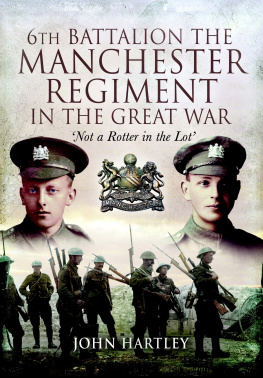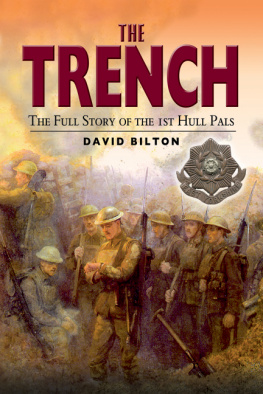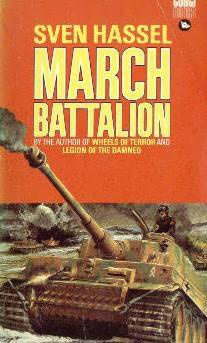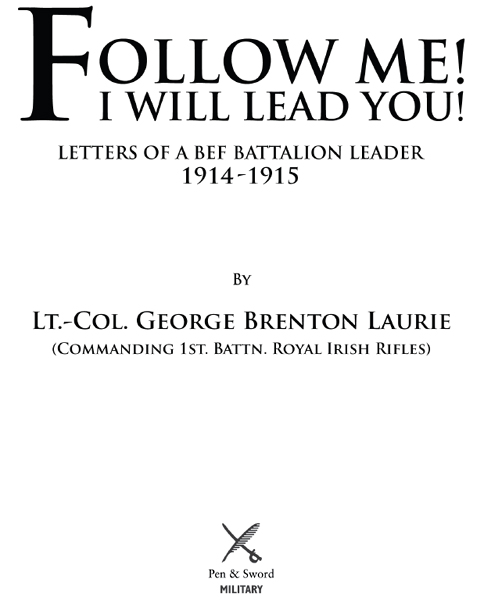
This edition published in 2014 by
Pen & Sword Military
An imprint of
Pen & Sword Books Ltd
47 Church Street
Barnsley
South Yorkshire
S70 2AS
This book was first published as Letters of Lieut.-Colonel G. B. Laurie
by Gale & Polden Ltd., Wellington Works, Aldershot, 1921.
Copyright Coda Books Ltd.
Published under licence by Pen & Sword Books Ltd.
ISBN: 9781473823334
EPUB ISBN: 9781473851146
PRC ISBN: 9781473851306
A CIP catalogue record for this book is available from the British Library
All rights reserved. No part of this book may be reproduced or transmitted in any form or by any
means, electronic or mechanical including photocopying, recording or by any information storage
and retrieval system, without permission from the Publisher in writing.
Printed and bound in England
By CPI Group (UK) Ltd, Croydon, CR0 4YY
Pen & Sword Books Ltd incorporates the imprints of Pen & Sword Aviation, Pen & Sword Family
History, Pen & Sword Maritime, Pen & Sword Military, Pen & Sword Discovery, Pen & Sword
Politics, Pen & Sword Atlas, Pen & Sword Archaeology, Wharncliffe Local History, Wharncliffe
True Crime, Wharncliffe Transport, Pen & Sword Select, Pen & Sword Military Classics, Leo
Cooper, The Praetorian Press, Claymore Press, Remember When, Seaforth Publishing and
Frontline Publishing
For a complete list of Pen & Sword titles please contact
PEN & SWORD BOOKS LIMITED
47 Church Street, Barnsley, South Yorkshire, S70 2AS, England
E-mail:
Website: www.pen-and-sword.co.uk
CONTENTS
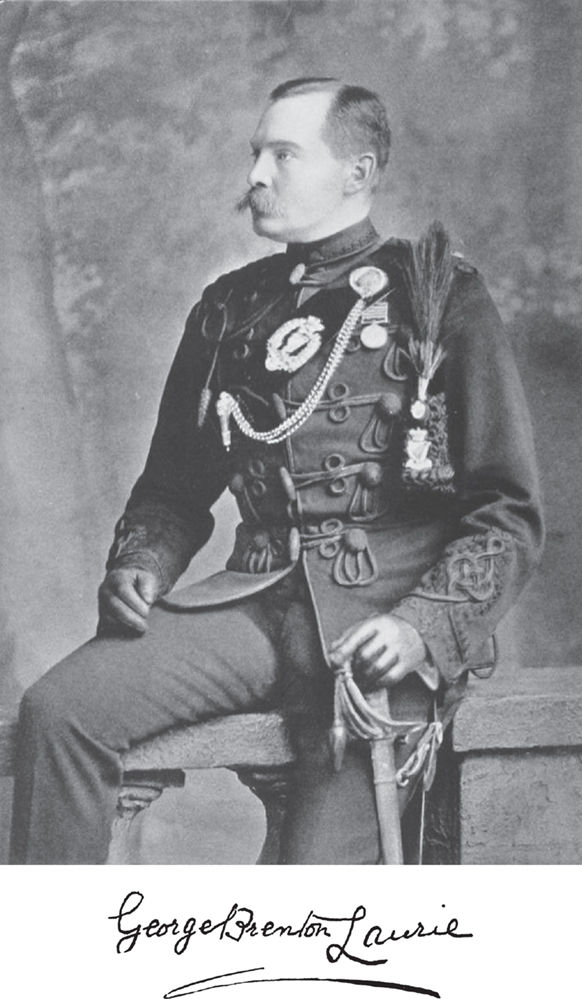
TO HALIBURTON, BLANCHE, AND SYDNEY.
MY DEAR CHILDREN,
I dedicate this little volume to you in memory of your father, who, as you know, fell on March 12th, 1915, in the Battle of Neuve Chapelle. These Letters, which were written to me from France during the first winter of the World War, do not in any way pretend to literary attainment; they are just the simple letters of a soldier recording as a diary the daily doings of his regiment at the front.
Often were they penned under great difficulties, and many a time under a rain of fire. The accounts of the awful loss of life and the discomforts experienced, both by officers and men unused to such severe climatic conditions, are sometimes heart-rending, and they make the reading sad.
Touches, however, of his natural cheerfulness relieve the greyness of the situation, and at times one can almost hear the lightheartedness of a schoolboy speaking.
Your father cared for his regiment as a father cares for his child, and was beloved by it. He obtained his commission in 1885 at 18 years of age, and was, curiously enough, the last officer to enter the British Army with the rank of a full Lieutenant. Had he lived till the following September, he would have been 30 years in the Royal Irish Rifles.
A short sketch of his life and military career is given in this book, and reference is made to the pleasure he took in being chosen to write the History of his Regiment, completed in 1914. He was also devoted to all kinds of sport as a pastime; but I will not write of these things; rather would I speak of his great wish to win fresh laurels for his regiment, and of how proud he was when, after the long, dreary winter in the trenches, the Royal Irish Rifles were the first to enter the village of Neuve Chapelle. But above all would I counsel you to follow his example in his faithful attention to duty, fulfilling the French proverb, Faites ce que doit advienne que pourra.
He died as a true soldier, leading his men, and what better death could be desired? He now lies in the British military cemetery of Pont du Hem, midway between Neuve Chapelle and Estaires, not far from Bethune in Northern France, and a little wooden cross marks the spot.
F. VERE-LAURIE.
CARLTON HALL,
CARLTON-ON-TRENT, NOTTS,
May 12th, 1921.
FOREWORD
BY LIEUT.-COLONEL SIR JOHN ROSS OF
BLADENSBURG, K.C.B., K.C.V.O.
(late Coldstream Guards).
COLONEL GEORGE LAURIE came from a military family. His father, a distinguished General, and his uncle both served in the Crimea and elsewhere, and many of his near relations joined the army, and were well-known zealous soldiers of their Sovereign. His elder brother fell in the Boer War in the beginning of this century, and he himself saw active service in the Sudan and in South Africa, before he landed in France to take his share in the great World War. On being promoted to the command of his battalion, he joined it at Kamptee in India, and this obliged him to leave his wife and family at home, for young children are not able to live in that tropical, very hot and unhealthy district. From that station, with scarcely any opportunity of seeing them again, he was launched into the seventies of a cold and wet winter in a water-logged part of Flanders. His experiences are graphically told in his letters, and they will show how much our gallant troops had to endure when engaged in the terrible conflict which the ambition of Prussia had provoked, and with what fortitude and courage they defended the country from the serious dangers that then menaced it.
All who have read these interesting letters will, I think, perceive that one dominant feature in Colonel Lauries character was a keen and all-pervading sense of duty, and an earnest determination to discharge it in every circumstance as thoroughly and as completely as possible. Never did he spare himself. What he had to exact from others, that he sternly imposed upon himself; and he fully shared with his men all the dangers and all the hardships of the war, with serene good temper and with a cheerful spirit. This fine disposition, which he himself had trained by self-discipline, ensured the prompt and willing obedience of his subordinates, and endeared him to all who were committed to his charge; it also secured for him the respect and the confidence of his superiors, who were well aware that every order they gave him would be carried out to the letter with prudence and with strict fidelity.
As he had married a beloved niece, I had many opportunities of observing his character, and I did not fail to recognize how devoted he was to his regiment and to the military career he had embraced and how thoroughly he was imbued with this great sense of duty. He had, moreover, considerable literary ability, and wrote a very excellent History of the Royal Irish Rifles; he also translated from the French an interesting account of the conquest of Algiers. In short, he took pains to learn the many details of his noble profession, and to make himself an efficient officer. Had he survived, my belief is that he would have advanced far as a soldier; for he combined with a studious earnest mind, much activity of body, and a sincere love for outdoor sport and manly exercise.
His letters show his affectionate nature; his care for his family and for his officers and men; and his solicitude for all with whom he was brought in contact. His sympathies were quick and real; and he I eh the responsibilities of his position, and what he owed to those who belonged to him, or who were placed under his command. And last, but by no means least, there are many short expressions in the letters to show the deep and all-absorbing feeling he entertained for Religion, and how his whole life was guided by the Faith that was in him. May his memory prove to be an incentive to his young family, so early and so cruelly deprived of the care of a loving father, to imitate his sterling qualities of head and heart!
Next page
